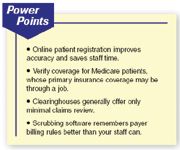Article
The art and science of the clean claim
Use your staff and computer technology the right way, and you can reduce costly denials and boost collections.

But failing to ensure that insurance claims are error-free will come back and wallop you in the bank account. Denied claims often fall through the cracks and aren't resubmitted. When they are, reworking one eats up about $25 worth of staff time. And payment is delayed, assuming you're not rejected again because you miss the filing deadline.
To top it off, denial rates in some dysfunctional practices approach 30 percent (normal is about 10 percent). Dirty claims, it turns out, represent a financial cancer. And it's so easy to make a mistake, given a Byzantine coding system, unique billing rules for thousands of health plans, and fallible humans who omit a digit when they type in a Social Security number.
Part of the cure hinges on organizing your entire staff to hit the billing bull's-eye every time. Another key is information technology, and its importance can't be underestimated. Payers, after all, use sophisticated software programs to spot and reject dirty claims. Fortunately, you can harness the same kind of software to take stains out of any claims.
We've interviewed consultants, software vendors, and office managers to discover the how-to's of the clean claim. What you'll learn will put a few more, uh, clams in your bank account.
Preregister new patients on the phone or online
Ask a busy receptionist to gather a new patient's personal and insurance information, and you're asking for trouble. Unfortunately, this common scenario creates a comedy of billing errors-errors that can ride a claim all the way to a payer's denial stamp.
"With all the interruptions, the receptionist who's entering patient data is more prone to make mistakes, like leaving a suffix off an ID number, or mistaking the secondary payer for the primary one," says Sara Larch, co-author of The Physician Billing Process, published by the Medical Group Management Association. "Plus, she may not have the time to verify insurance coverage."
Accordingly, experts like Larch recommend that your staff preregister new patients when they call for an appointment. It's as simple as asking them to pull out an insurance card and read off the names and numbers. Busy patients will oblige, provided you motivate them.
"You can say, 'We want to make sure we bill your insurance company correctly so you don't get the bill,' " says Larch, chief operating officer of a large multispecialty group at the University of Maryland School of Medicine in Baltimore. "The patient will do anything to avoid that!"
Train staffers to inquire about the card itself, which may confuse patients. "At our practice, we've made copies of the major insurance cards," says Larch. "When we talk to patients on the phone, we ask questions like, 'Is there a red flower in the upper right-hand corner?' "





